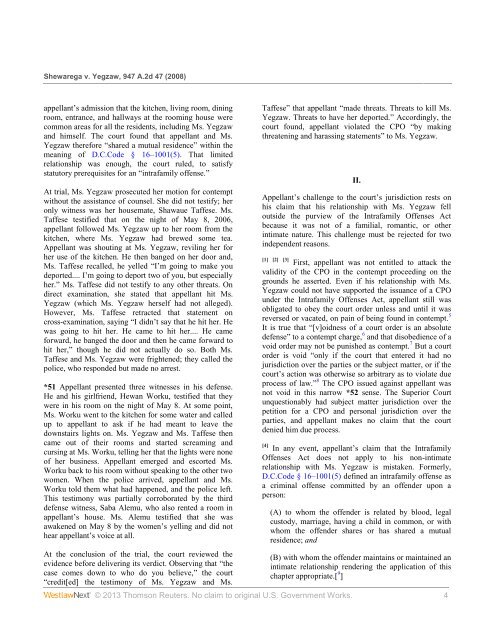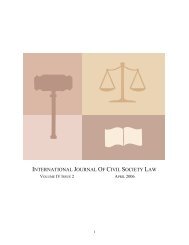Shewarega v. Yegzaw - Law Clinics
Shewarega v. Yegzaw - Law Clinics
Shewarega v. Yegzaw - Law Clinics
Create successful ePaper yourself
Turn your PDF publications into a flip-book with our unique Google optimized e-Paper software.
<strong>Shewarega</strong> v. <strong>Yegzaw</strong>, 947 A.2d 47 (2008)appellant’s admission that the kitchen, living room, diningroom, entrance, and hallways at the rooming house werecommon areas for all the residents, including Ms. <strong>Yegzaw</strong>and himself. The court found that appellant and Ms.<strong>Yegzaw</strong> therefore “shared a mutual residence” within themeaning of D.C.Code § 16–1001(5). That limitedrelationship was enough, the court ruled, to satisfystatutory prerequisites for an “intrafamily offense.”At trial, Ms. <strong>Yegzaw</strong> prosecuted her motion for contemptwithout the assistance of counsel. She did not testify; heronly witness was her housemate, Shawaue Taffese. Ms.Taffese testified that on the night of May 8, 2006,appellant followed Ms. <strong>Yegzaw</strong> up to her room from thekitchen, where Ms. <strong>Yegzaw</strong> had brewed some tea.Appellant was shouting at Ms. <strong>Yegzaw</strong>, reviling her forher use of the kitchen. He then banged on her door and,Ms. Taffese recalled, he yelled “I’m going to make youdeported.... I’m going to deport two of you, but especiallyher.” Ms. Taffese did not testify to any other threats. Ondirect examination, she stated that appellant hit Ms.<strong>Yegzaw</strong> (which Ms. <strong>Yegzaw</strong> herself had not alleged).However, Ms. Taffese retracted that statement oncross-examination, saying “I didn’t say that he hit her. Hewas going to hit her. He came to hit her.... He cameforward, he banged the door and then he came forward tohit her,” though he did not actually do so. Both Ms.Taffese and Ms. <strong>Yegzaw</strong> were frightened; they called thepolice, who responded but made no arrest.*51 Appellant presented three witnesses in his defense.He and his girlfriend, Hewan Worku, testified that theywere in his room on the night of May 8. At some point,Ms. Worku went to the kitchen for some water and calledup to appellant to ask if he had meant to leave thedownstairs lights on. Ms. <strong>Yegzaw</strong> and Ms. Taffese thencame out of their rooms and started screaming andcursing at Ms. Worku, telling her that the lights were noneof her business. Appellant emerged and escorted Ms.Worku back to his room without speaking to the other twowomen. When the police arrived, appellant and Ms.Worku told them what had happened, and the police left.This testimony was partially corroborated by the thirddefense witness, Saba Alemu, who also rented a room inappellant’s house. Ms. Alemu testified that she wasawakened on May 8 by the women’s yelling and did nothear appellant’s voice at all.At the conclusion of the trial, the court reviewed theevidence before delivering its verdict. Observing that “thecase comes down to who do you believe,” the court“credit[ed] the testimony of Ms. <strong>Yegzaw</strong> and Ms.Taffese” that appellant “made threats. Threats to kill Ms.<strong>Yegzaw</strong>. Threats to have her deported.” Accordingly, thecourt found, appellant violated the CPO “by makingthreatening and harassing statements” to Ms. <strong>Yegzaw</strong>.© 2013 Thomson Reuters. No claim to original U.S. Government Works. 4II.Appellant’s challenge to the court’s jurisdiction rests onhis claim that his relationship with Ms. <strong>Yegzaw</strong> felloutside the purview of the Intrafamily Offenses Actbecause it was not of a familial, romantic, or otherintimate nature. This challenge must be rejected for twoindependent reasons.[1] [2] [3]First, appellant was not entitled to attack thevalidity of the CPO in the contempt proceeding on thegrounds he asserted. Even if his relationship with Ms.<strong>Yegzaw</strong> could not have supported the issuance of a CPOunder the Intrafamily Offenses Act, appellant still wasobligated to obey the court order unless and until it wasreversed or vacated, on pain of being found in contempt. 5It is true that “[v]oidness of a court order is an absolutedefense” to a contempt charge, 6 and that disobedience of avoid order may not be punished as contempt. 7 But a courtorder is void “only if the court that entered it had nojurisdiction over the parties or the subject matter, or if thecourt’s action was otherwise so arbitrary as to violate dueprocess of law.” 8 The CPO issued against appellant wasnot void in this narrow *52 sense. The Superior Courtunquestionably had subject matter jurisdiction over thepetition for a CPO and personal jurisdiction over theparties, and appellant makes no claim that the courtdenied him due process.[4]In any event, appellant’s claim that the IntrafamilyOffenses Act does not apply to his non-intimaterelationship with Ms. <strong>Yegzaw</strong> is mistaken. Formerly,D.C.Code § 16–1001(5) defined an intrafamily offense asa criminal offense committed by an offender upon aperson:(A) to whom the offender is related by blood, legalcustody, marriage, having a child in common, or withwhom the offender shares or has shared a mutualresidence; and(B) with whom the offender maintains or maintained anintimate relationship rendering the application of thischapter appropriate.[ 9 ]
















